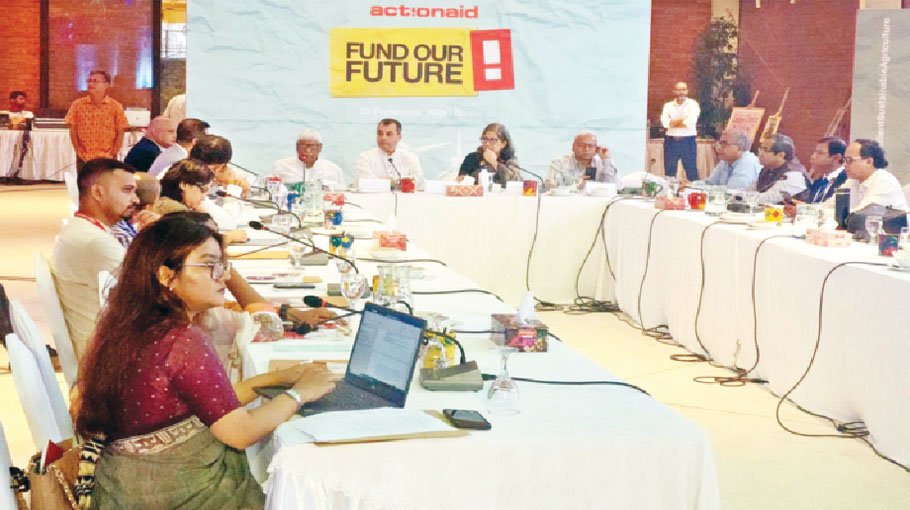‘Stop financing fossil fuels’


The fossil fuel and industrial agriculture industries in the Global South are receiving an annual average of 20 times more financing from banks than governments are receiving for climate solutions, according to a study.
According to the study, since the adoption of Paris Agreement on Climate Change in 2016, banks have put $3.2 trillion towards the expansion of fossil fuels, number one cause of climate change and $370 billion in industrial agriculture, second contributor of climate change. Top banks funding the climate crisis include HSBC, Citigroup and JP Morgan Chase among others.
The ActionAid conducted the study. The findings of the study were revealed in the launching of a global campaign on climate justice called ‘Fund Our Future’ on September 5 at a convention center in Dhaka, says a press release.
The study report found the top banks from each region funding fossils fuels and industrial agriculture in the Global Southare from Europe: HSBC, BNP Paribas, SocieteGenerale, Barclays; fromAmericas: Citibank, JPMorgan Chase, Bank of America;from Asia: Industrial and Commercial Bank of China, China CITIC Bank, Bank of China and Mitsubishi UFJ Financial.
The report also says the largest recipient of industrial agriculture financing in the Global South is Bayer which has received an estimated US$20.6 billion in financing for its industrial agriculture operations in the Global South since 2016.
In a panel discussion held during the campaign launch, the chief guest, Saber Hossain Chowdhury, Chairman of the Parliamentary Standing Committee on the Ministry of Environment, Forest, and Climate Change opined, “The biggest challenge of climate crisis is that we are creating problems faster than the solutions. We need to find an overall framework to address the problems and ensure effective regulation of the policies. Bangladesh has no clear net zero greenhouse gas emission target; that need to be set up and greater coordination between the ministries is required to have a sustainable solution. We can’t rely on other nations for solutions; we have to do the right things. For smart Bangladesh we have to make smart choices.”
Dr. Saleemul Huq, Director of ICCCAD, added, "We have to persuade our government to put pressure on the polluters of the world. There are certain governments in the world who speak on behalf of the polluters. Rich people are creating problems and the poor people are suffering. Let’s not fool ourselves that this is going to be easy. Every one of us has tobe a warrior to fight against climate injustice.”
Farah Kabir, Country Director of ActionAid Bangladesh said. “This report exposes how banks and financial institutions are the key drivers behind our climate crisis. We need to set targets, accountability, and monitoring. We ask the decision makers to fund our future responsibly to heal the world.
We must ask for justice and continue our fight with collective efforts.”
Dr Khondaker Golam Moazzem, Research Director,CPD in his speech said, “Steps need to be taken to shift from fossil fuel subsidy and utilize that for alternative sustainable routes. It is good that government is setting targets for renewable energy, but if our ultimate target is fossil fuel reduction, we also need a reduction target.”
Khaondekar Morshed Millat, Former Director of Sustainable Finance Depart of Bangladesh Bank in his speech said, “The central bank needs to be the watchdog for our environmental future. Sustainability rating of Banks needs to reevaluated. Just as rivers of money are fueling the climate crisis, regulatory mussel should steer banks toward sustainable and renewable investment.
Anwar Farooq, Former secretary Ministry of Agriculture, Government of Bangladesh; Shubasish Barua, Head of Impact Business Green Delta Insurance Company Limited (GDIC); Abul Kalam Azad, former Principal Secretary at Prime Minister’s Office: Dr. Atik Rahman, Executive Director of Bangladesh Centre of Advanced Studies, Samia Chowdhury, CEO, MTB Foundationalso spoke in the panel discussion among other distinguished panelists.
The report calls for banks to immediately stop projects and corporate financing for all new deforestation, coal and fossil fuel expansion activities, and rapidly phase out financing of all other fossil fuel and harmful industrial agriculture activities. Report further says national and regional governments must regulate the banking and finance sectors to stop the financing of fossil fuel expansion and scale up support and planning for just transitions to real solutions such as renewable energy and agroecology.


